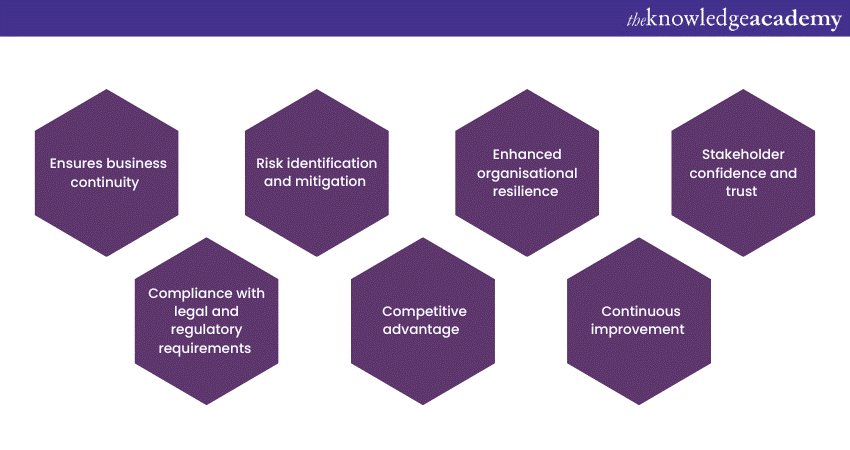We may not have the course you’re looking for. If you enquire or give us a call on + 1-866 272 8822 and speak to our training experts, we may still be able to help with your training requirements.
We ensure quality, budget-alignment, and timely delivery by our expert instructors.

Think of your business as a well-oiled machine. How do you ensure it keeps running smoothly even when unexpected challenges arise? This is where ISO 22301 Clauses become essential. But what exactly are these clauses, and why are they crucial for your organisation's resilience?
ISO 22301 Clauses offer a comprehensive framework for business continuity management. They enable organisations to prepare for, respond to, and recover from disruptions.
In this detailed blog, we'll explore each clause, emphasising their significance and practical uses. What are ISO 22301 Clauses, and how can they strengthen your business against unexpected challenges? Let's dive in and discover.
Table of Contents
1) Understanding ISO 22301 Clauses
2) What are Various ISO 22301 Clauses?
3) Understanding the Rudimentary Clauses
4) Benefits of implementing ISO 22301
5) Conclusion
Understanding ISO 22301 Clauses
In ISO standards, Clauses are sections or divisions that outline specific requirements and guidelines related to a particular topic. These Clauses provide a structured approach to implementing the standard and serve as a roadmap for organisations.
They are divided into sections, each addressing a specific aspect of business continuity management. The standard follows a logical progression, starting with the organisation's context and culminating in continuous improvement.
Therefore, they provide a comprehensive framework for organisations to assess, plan, and implement measures to mitigate risks and ensure Business Resilience. It also allows them to develop robust strategies, policies, and procedures that enable them to respond effectively to disruptions and minimise potential impacts.

What are Various ISO 22301 Clauses?
ISO 22301 is an international business continuity standard for management. It comprises several Clauses outlining the requirements and objectives for establishing an effective business continuity management system (BCMS).
It is divided into 11 Clauses. While Clauses 0 to 3 are introductory and are not required for implementation, whereas the key Clauses (4 to 10) are mandatory. Organisations must meet all the requirements specified in these Clauses to comply with the standard. So, let’s explore the key Clauses or Cluses four to ten in ISO 22301 and their respective purposes:
Clause 4: Context of the Organisation
Clause 4 focuses on understanding the organisation’s context. In simple terms, it mandates organisations to identify internal (organisation’s size, structure, culture, resources, and capabilities) and external factors (changes in regulatory requirements, economic conditions, market dynamics, technological advancements and overall business environment) that could impact their ability to maintain business continuity. By assessing the context, including stakeholders, legal requirements, and societal expectations, organisations can develop strategies tailored to their specific circumstances.
Clause 5: Leadership
Leadership commitment is crucial for successfully implementing a Business Continuity Management system (BCMS). This is where Clause 5 becomes important. It emphasises the active engagement of top management in establishing and maintaining the BCMS.
According to this Clause, leadership must demonstrate their support, allocate necessary resources, and integrate business continuity into the organisation’s overall management system.
Clause 6: Planning
Planning is a fundamental aspect of effective business continuity management. Clause 6 outlines the requirements for organisations to develop a business continuity policy, set objectives, and conduct a risk assessment.
Organisations can identify potential threats, vulnerabilities, and impacts through comprehensive planning. Therefore, they can establish proactive measures to mitigate risks and ensure the continuity of critical operations.
Clause 7: Support
Clause 7 emphasises the need for organisations to ensure that personnel are competent and aware of their roles in implementing the BCMS. Simply supporting the BCMS means providing the necessary resources and competencies. It also covers communication channels, documented information, and establishing awareness programs to facilitate effective business continuity practices.
Clause 8: Operation
Clause 8 focuses on the operational aspects of business continuity management. It outlines the requirements for incident response, business continuity plans, and recovery procedures.
It guides how organisations should plan, establish, implement, and control their business continuity processes to ensure adequate response and recovery from disruptive incidents. By implementing these measures, organisations can respond promptly to disruptions, minimise impacts on critical activities, and recover operations within acceptable timeframes.
Clause 9: Performance Evaluation
Monitoring and evaluating the performance of the BCMS is essential for continuous improvement. This is why adhering to Clause 9 is crucial for organisations. It requires them to establish processes for measuring, monitoring, analysing, and evaluating their business continuity performance. Through internal audits, management reviews, and performance assessments, organisations can identify areas for improvement and enhance their resilience.
Clause 10: Improvement
Improvement is a key principle of ISO 22301. Clause 10 emphasises the importance of continually improving the BCMS based on the results of performance evaluations, audits, and reviews. Organisations should learn from incidents, address non-conformities, and enhance their capabilities by adopting best practices and lessons learned.
Get familiar with the implementation phases of the ISO 22301 framework with our ISO 22301 Foundation Training.
Understanding the Rudimentary Clauses
Clauses 1 to 3 of ISO 22301 provide the introductory framework for understanding the standard’s purpose, scope, and normative references. While these Clauses are not mandatory for implementation, they are crucial in establishing the context and foundation for effective business continuity management. Let’s have a close look at these Clauses:
Clause 1: Scope
Clause 1 outlines the scope of ISO 22301, defining the boundaries and applicability of the standard. It clarifies that the standard is designed to help organisations establish, implement, maintain, and improve a BCMS. The scope also emphasises the importance of considering the organisation’s products, services, and interested parties when implementing the standard’s requirements.
Clause 2: Normative References
This Clause lists normative references and external documents essential for understanding and implementing ISO 22301. These references include other standards, guidelines, or regulations that organisations can consult for further guidance and alignment. Normative references also help ensure consistency and interoperability between various management systems and industry best practices.
Clause 3: Terms and Definitions
It includes a comprehensive set of terms and definitions used throughout ISO 22301. These definitions establish a common understanding of the terminology used in the standard, ensuring clear communication and interpretation. By defining key concepts related to business continuity management, Clause 3 helps eliminate ambiguity and promotes the consistent implementation of ISO 22301.
Learn about the principles of incident response and business continuity management with our ISO 22301 Training.
Benefits of implementing ISO 22301
Implementing ISO 22301 offers numerous benefits for organisations of all sizes and sectors. By adopting this standard, organisations can enhance their resilience, improve their ability to respond to disruptions and safeguard their long-term success. Here are some key benefits of implementing ISO 22301:

Ensures Business Continuity
The primary objective of ISO 22301 is to enable organisations to continue their critical operations during and after disruptive incidents. By implementing the standard's requirements, organisations establish robust business continuity management systems that help minimise downtime, maintain essential services, and prevent financial losses.
Risk identification and Mitigation
ISO 22301 emphasises the importance of conducting comprehensive risk assessments. This enables organisations to identify potential threats, vulnerabilities, and impacts to their operations. By understanding these risks, organisations can implement proactive measures to mitigate them, reducing the likelihood and severity of disruptions.
Enhanced Organisational Resilience
Implementing ISO 22301 fosters a culture of resilience within an organisation. It ensures that business continuity considerations are integrated into the organisation’s strategic planning, decision-making processes, and day-to-day operations. This resilience enables organisations to adapt to changing circumstances, recover quickly from disruptions, and maintain the trust of stakeholders.
Stakeholder Confidence and Trust
ISO 22301 certification demonstrates an organisation’s commitment to business continuity and its ability to manage disruptions effectively. This enhances stakeholder confidence, including customers, suppliers, employees, investors, and regulatory bodies. Stakeholders can trust that the organisation has measures to ensure the continuity of crucial services and minimise the impact of disruptions.
Compliance with Legal and Regulatory Requirements
ISO 22301 helps organisations meet legal and regulatory requirements related to business continuity. By implementing the standard’s requirements, organisations demonstrate their commitment to Compliance and can more effectively address legal obligations regarding protecting critical operations and safeguarding sensitive information.
Competitive Advantage
ISO 22301 certification can provide a competitive edge in the marketplace. Organisations that have achieved certification can differentiate themselves from competitors by showcasing their commitment to resilience and ability to maintain business continuity. This can attract customers who prioritise working with reliable and resilient partners.
Continuous Improvement
ISO 22301 promotes a culture of continuous improvement. Organisations must regularly review and evaluate their Business Continuity Management Systems, identify areas for enhancement, and take corrective actions. This iterative process allows organisations to continually enhance their resilience and adapt strategies to emerging risks and changing business environments.
Excel in your interview! Review essential Compliance Interview Questions to demonstrate your expertise and land the role you deserve.
Conclusion
In conclusion, mastering ISO 22301 Clauses is essential for building a resilient organisation capable of withstanding disruptions. By understanding and implementing these clauses, you can ensure your business remains robust and prepared for any challenge. Embrace these clauses and fortify your path to uninterrupted success.
Gain in-depth knowledge of the ISO 22301 standard. Register for our ISO 22301 Certified Business Continuity Management Course now!
Frequently Asked Questions

Certainty and compliance of business continuity standards emanate from comprehending the terms used in ISO 22301 Clause 3. It also makes concrete definitions of common concepts such as risk, impact and recovery pointing your organisations processes in the right direction.

According to ISO 22301, Business Impact Analysis (BIA) is a procedure of evaluating the effects of disruptions towards activities of a business. It maps out the risk activities, dependencies and recovery strategies to rationalise out the spending for continuity and resilience solutions.

The Knowledge Academy takes global learning to new heights, offering over 30,000 online courses across 490+ locations in 220 countries. This expansive reach ensures accessibility and convenience for learners worldwide.
Alongside our diverse Online Course Catalogue, encompassing 19 major categories, we go the extra mile by providing a plethora of free educational Online Resources like News updates, Blogs, videos, webinars, and interview questions. Tailoring learning experiences further, professionals can maximise value with customisable Course Bundles of TKA.

The Knowledge Academy’s Knowledge Pass, a prepaid voucher, adds another layer of flexibility, allowing course bookings over a 12-month period. Join us on a journey where education knows no bounds.

The Knowledge Academy offers various ISO 22301 Trainings, including the ISO 22301 Foundation Training, ISO 22301 Lead Auditor Training, and ISO 22301 Internal auditor Training. . These courses cater to different skill levels, providing comprehensive insights into ISO 22301 Jobs.
Our ISO & Compliance Blogs cover a range of topics related to Earned Value Management, offering valuable resources, best practices, and industry insights. Whether you are a beginner or looking to advance your Project Management skills, The Knowledge Academy's diverse courses and informative blogs have got you covered.
Upcoming IT Service Management Resources Batches & Dates
Date
 ISO 22301 Foundation Training
ISO 22301 Foundation Training
Mon 17th Feb 2025
Mon 21st Apr 2025
Mon 23rd Jun 2025
Mon 18th Aug 2025
Mon 20th Oct 2025
Mon 15th Dec 2025







 Top Rated Course
Top Rated Course


 If you wish to make any changes to your course, please
If you wish to make any changes to your course, please


